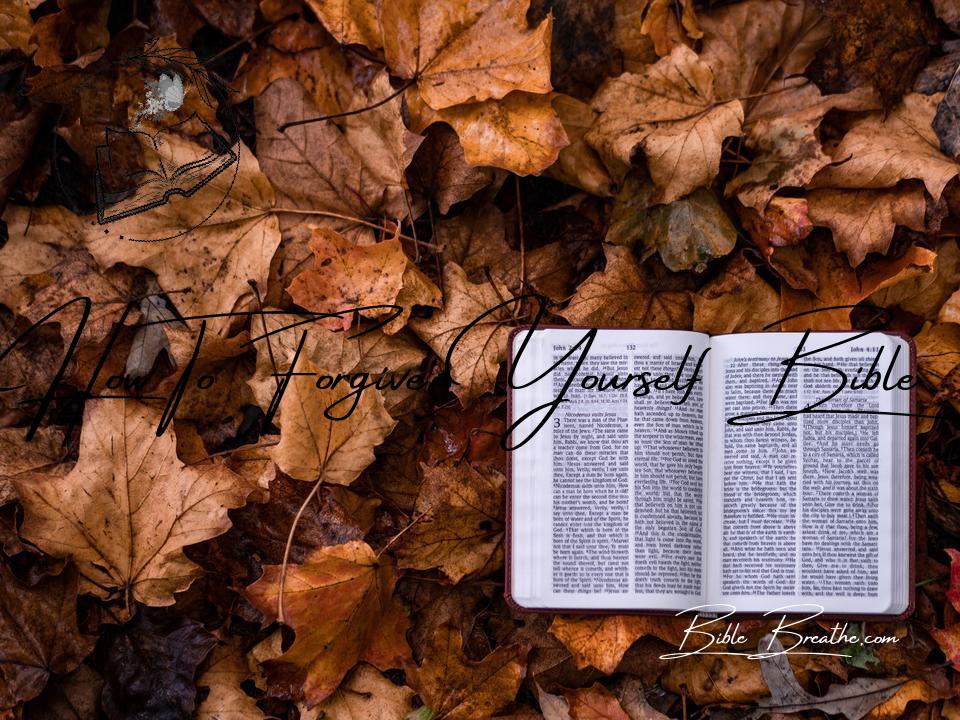How to Forgive Yourself Bible: Ever been stuck in the forgiveness traffic jam?
You’re not alone!
It’s like trying to untangle a knotted necklace.
Self-forgiveness, especially in the light of God’s Word, can be a wrestling match.
It’s understanding God’s forgiveness that holds the key.
See, it’s not just about forgiving others; it’s about setting yourself free, too.
We’re talking biblical teachings, where repentance and reconciliation play a tag-team game.
God’s grace?
That’s your eternal green light.
In the grand story of life, it’s about laying down your self-justification and patching up those old wounds.
Childhood trauma and pride, they’re like roadblocks on the highway to self-forgiveness.
But here’s the deal: We’ve got God’s GPS, guiding us on this spiritual journey.
So, let’s shed the baggage of guilt and shame and steer towards healing and restoration through the Word.
You’re not alone on this road, my friend.
🌟
Key Takeaways
- Understanding and accepting God’s forgiveness is at the core of learning how to forgive yourself according to biblical teachings. Recognizing that God’s love and mercy extend to all who repent and seek forgiveness is the first step in finding solace and healing.
- Self-forgiveness is a transformative process that involves acknowledging one’s mistakes, seeking God’s forgiveness, and letting go of guilt and shame. It’s important to remember that God’s forgiveness is unconditional and that dwelling on past sins can hinder spiritual growth.
- The journey of self-forgiveness may be challenging, and seeking help and guidance is crucial. Turning to trusted religious leaders, counselors, or mentors can provide valuable support and perspective during the process. Sharing one’s struggles with others can also foster a sense of community and understanding.
- Forgiving yourself aligns with the biblical principles of repentance, redemption, and renewal. The Bible emphasizes that through God’s grace, individuals can find freedom from the burden of sin and a path towards spiritual growth and transformation.
- In conclusion, learning how to forgive yourself according to the Bible involves embracing God’s forgiveness, taking concrete steps towards self-forgiveness, and seeking support when needed. It’s a journey of healing and renewal, rooted in the timeless teachings of forgiveness and grace found in the Scriptures.
Finding Freedom in Self-Forgiveness
Photo modified by BibleBreathe.com. Original photo by Alem Sánchez on Pexels
Have you ever felt like you’re locked inside a prison of your own mistakes, the heavy chains of guilt and self-condemnation weighing you down?
It’s a common struggle, one that often leads us to be much harsher on ourselves than we would ever be on others.
But, my friends, the Bible has some profound wisdom to share on this very topic.
The Human Condition: Falling Short and Self-Criticism
In the pages of Romans 3:23, we’re reminded that “all have sinned, and come short of the glory of God.” This is the raw truth about being human.
Every one of us, at some point, stumbles and falls.
Yet, our own pride can sometimes make our mistakes seem unforgivable, leading us down a path of self-condemnation.
Think about it for a moment: have you ever held a grudge against a close friend for a minor slip-up?
Probably not.
Yet, when it comes to our own actions, we can become relentless judges.
This tendency to view our wrongs through an unforgiving lens can be a heavy burden, obstructing our spiritual growth and journey.
Embracing God’s Overflowing Forgiveness
Now, let’s turn to 2 Corinthians 2:6-8, where we find a story of a person in the Christian community who faced condemnation.
Paul urged the community to forgive and comfort this individual, cautioning against excessive sorrow and self-condemnation that can lead to despair.
Think about it in a modern context: if someone you care about makes a mistake, what’s your reaction?
You’d likely forgive them, encourage them to learn, and move forward.
Well, my friends, God, in His infinite grace and kindness, does just that.
His love and forgiveness know no bounds, surpassing our human understanding.
If the Divine can forgive and offer the chance for redemption, who are we to deny the same to ourselves?
It’s absolutely crucial to grasp this profound truth and understand the dangers of clinging to guilt and self-condemnation.
God’s forgiveness goes far beyond any transgression.
In the realm of spiritual healing and reconciliation, God’s grace is our guiding light.
We must learn to extend the same compassion and forgiveness to ourselves that He so generously bestows upon us.
For all have sinned, and come short of the glory of God.” – Romans 3:23 (KJV)
“Lest perhaps such a one should be swallowed up with overmuch sorrow. Wherefore I beseech you that ye would confirm your love toward him.” – 2 Corinthians 2:6-8 (KJV)
The Art of Self-Forgiveness: A Biblical Perspective
Photo modified by BibleBreathe.com. Original photo by Ron Lach on Pexels
Forgiving yourself, my friends, is like navigating a winding river, full of twists and turns.
But don’t fret, because the Bible, our trusty compass, points us towards a path of self-forgiveness that’s as tender as a mother’s embrace and as transformative as a caterpillar becoming a butterfly.
Embracing the Promise of God’s Forgiveness
When it comes to forgiving ourselves, we can take comfort in God’s unwavering promise of forgiveness.
In the book of John 1:9 (KJV), it’s written:
“If we confess our sins, he is faithful and just to forgive us our sins, and to cleanse us from all unrighteousness.”
Imagine this: you’re in a courtroom, and the judge knows your every thought and intention.
As soon as you admit your mistakes sincerely, he’s ready to pardon you.
That’s how God’s forgiveness works—it embraces us with love and mercy, allowing us to let go of the weight of our wrongdoings.
God’s Kindness and Compassion: Keys to Self-Forgiveness
In the intricate tapestry of self-forgiveness, God’s kindness and compassion are like a gentle hand guiding us.
In Ephesians 4:32 (KJV), it says:
“And be ye kind one to another, tenderhearted, forgiving one another, even as God for Christ’s sake hath forgiven you.”
Picture this: God extends a compassionate hand, encouraging us to show the same grace to ourselves.
Just as God shows kindness and mercy to us, we should mirror that in our relationship with ourselves.
Remember, being human means being imperfect, and those imperfections are part of our journey toward spiritual growth and redemption.
Repentance: The Journey Within
In the depths of our souls, true repentance resides.
It’s not just about feeling sorry; it’s about a profound acknowledgment of our wrongs.
This journey invites us to confront our past, uncover our vulnerabilities, and address the root causes of our actions.
It’s like restoring a damaged building, brick by brick, repairing not just the surface but the very foundation.
As we embark on this journey of self-discovery and self-forgiveness, let’s also consider the shadows of our past—childhood traumas, pride, and self-justifications.
How have these elements shaped us, and how can we find comfort and healing through God’s grace?
Remember, my friends, the path to self-forgiveness is an adventure.
It requires introspection, prayer, and maybe even seeking guidance through Christian counseling and biblical teachings.
Embrace this journey, for it’s through it that we find the peace and redemption that God’s grace and kindness abundantly provide.
Embracing Self-Forgiveness: Lessons from the Bible
Photo modified by BibleBreathe.com. Original photo by RDNE Stock project on Pexels
Life is like a beautiful tapestry, woven with threads of experience, and forgiveness, my friends, is the golden thread that repairs the frayed edges of our mistakes and wrongdoings.
But forgiving oneself?
Well, that’s like delicately balancing on a tightrope of understanding, humility, and love.
Owning Up and Letting Go: The First Step to Self-Forgiveness
The journey to self-forgiveness begins with clarity.
We must differentiate between our personal responsibility and the actions of others.
The Bible tells us that we are responsible for our own choices, but it also acknowledges the impact of external factors, like the scars of childhood trauma.
Recognizing this distinction can help us shed the weight of excessive self-condemnation.
Just as you would extend empathy and understanding to a dear friend carrying the wounds of a difficult past, we must do the same for ourselves.
Self-compassion is the key to unlocking the door to self-forgiveness.
Humility Triumphs Over Pride: Accepting Grace
Pride can be a mighty obstacle on the path to self-forgiveness.
The Bible cautions against the pitfalls of pride and self-condemnation, urging us to let go of these burdens.
Understanding that we are all fallible and in need of grace can shift our perspective.
God’s grace is like a lighthouse, guiding us towards forgiveness.
When we grasp the depth of this grace, we realize that dwelling on our past mistakes serves no purpose.
Instead, we should focus on learning and growing from them.
Repair, Reconciliation, and Inner Peace
Making amends is a crucial part of the self-forgiveness journey, just as seeking reconciliation is in our relationship with God.
Recognizing our wrongs and taking steps to make things right can mend our inner world.
It’s like repairing bridges we may have burned, deepening our experience of God’s forgiveness and paving the way for self-forgiveness.
The Power of Love: A Cornerstone of Self-Forgiveness
Love, my friends, is a force to be reckoned with when it comes to forgiveness.
By embracing love and vulnerability, we allow ourselves to heal.
Through the lens of a biblical worldview, we understand that God’s love is unconditional, providing a model for us to love ourselves despite our imperfections.
Love is the solid ground upon which the fortress of self-forgiveness can be built, allowing us to break free from the chains of guilt and shame.
In this journey toward self-forgiveness, let us remember that just as God offers us redemption and mercy, we too can extend the same to ourselves.
“For all have sinned and fall short of the glory of God…” – Romans 3:23 (KJV)
“But he giveth more grace. Wherefore he saith, God resisteth the proud, but giveth grace unto the humble.” – James 4:6 (KJV)
Christian Counseling: Illuminating the Path to Self-Forgiveness
Photo modified by BibleBreathe.com. Original photo by cottonbro studio on Pexels
Imagine, my friends, that self-forgiveness is a journey through a complex maze, a journey that can be as challenging as finding your way in the dark.
But in the midst of this labyrinth, Christian counseling shines like a lantern, offering profound insights and wisdom to help us navigate our innermost selves and discover the path to forgiveness.
Guiding Hands Through the Shadows of Self-Condemnation
Think of self-condemnation as heavy chains that weigh us down, preventing us from embracing the freedom that forgiveness promises.
It’s like carrying a burden that no one else can see.
But Christian counseling steps in as the key to unlock these chains, providing a safe space to voice our regrets and mistakes.
When we speak our burdens aloud, it’s as if we’re freeing our souls from these heavy shackles.
Biblical wisdom emphasizes the importance of confession, not just to God but also to fellow believers.
In James 5:16 (KJV), it’s written:
“Confess your faults one to another, and pray one for another, that ye may be healed.”
By confessing to a Christian counselor, we open the door to healing and forgiveness.
The counselor becomes a guide, leading us through a structured process that combines biblical principles, repentance, and deep self-reflection.
It’s like having a therapeutic conversation where our regrets and wrongdoings are met with empathy, compassion, and encouragement toward genuine repentance.
Embracing a Biblical Worldview: A Foundation for Self-Forgiveness
Our worldview, shaped by our beliefs and faith, is the lens through which we see ourselves and the world.
A biblical worldview, firmly rooted in the teachings of the Bible, serves as a strong pillar in the journey of self-forgiveness.
Think of it as the solid ground upon which we rebuild our self-worth and dignity, which may have been eroded by guilt and shame.
The Bible reminds us in Psalm 103:12 (KJV):
“As far as the east is from the west, so far hath he removed our transgressions from us.”
This powerful truth, ingrained in a biblical worldview, encourages us to extend the same forgiveness to ourselves that God extends to us.
It’s about recognizing that we are a work in progress, continuously evolving on our spiritual journey.
Through Christian counseling, we align our self-perception with this profound biblical truth, stepping into the light of redemption and self-forgiveness.
In summary, my friends, Christian counseling serves as a guiding light, leading us through the intricate maze of self-forgiveness.
It helps us embrace our vulnerabilities and find solace in God’s boundless grace.
It invites us to see ourselves through the lens of a biblical worldview, a perspective that liberates us from self-condemnation and welcomes us into the warm embrace of self-forgiveness.
Frequently Asked Questions (FAQs) About How To Forgive Yourself Bible
Why is it so hard to forgive myself?
Self-forgiveness can be challenging because we often hold ourselves to high standards.
Remember that God’s forgiveness is available, and learn from your mistakes.
Seek support from a religious community, pray for guidance, and practice self-compassion, recognizing that we all make errors.
How can I know that God has truly forgiven me?
Trust in God’s promises of forgiveness when you repent sincerely.
Seek assurance through prayer, studying Scripture, and believing in His love and grace.
What if I can’t let go of my past mistakes?
In the face of past mistakes, embrace self-forgiveness.
Recognize your humanity, learn from past errors, and acknowledge the possibility of growth.
Seek guidance from religious teachings on redemption and focus on self-improvement.
Embrace the present, demonstrating gratitude for the opportunity to learn and evolve.





